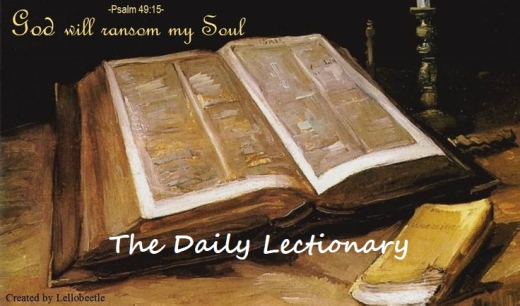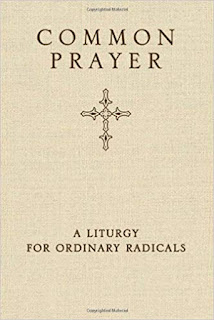The Daily Lectionary
WEDNESDAY, July 1, 2020
Psalm 119:161-168; Jeremiah 18:1-11; Matthew 11:20-24
(Revised Common Lectionary Year A)
Loving God’s law
161 Rulers persecute me without cause,
but my heart trembles at your word.
162 I rejoice in your promise
like one who finds great spoil.
163 I hate and detest falsehood
but I love your law.
164 Seven times a day I praise you
for your righteous laws.
165 Great peace have those who love your law,
and nothing can make them stumble.
166 I wait for your salvation, Lord,
and I follow your commands.
167 I obey your statutes,
for I love them greatly.
168 I obey your precepts and your statutes,
for all my ways are known to you.
Jeremiah at the potter’s wheel
18:1 This is the word that came to Jeremiah from the Lord: 2 “Go down to the potter’s house, and there I will give you my message.” 3 So I went down to the potter’s house, and I saw him working at the wheel. 4 But the pot he was shaping from the clay was marred in his hands; so the potter formed it into another pot, shaping it as seemed best to him.
5 Then the word of the Lord came to me. 6 He said, “Can I not do with you, Israel, as this potter does?” declares the Lord. “Like clay in the hand of the potter, so are you in my hand, Israel. 7 If at any time I announce that a nation or kingdom is to be uprooted, torn down and destroyed, 8 and if that nation I warned repents of its evil, then I will relent and not inflict on it the disaster I had planned. 9 And if at another time I announce that a nation or kingdom is to be built up and planted, 10 and if it does evil in my sight and does not obey me, then I will reconsider the good I had intended to do for it.
11 “Now therefore say to the people of Judah and those living in Jerusalem, ‘This is what the Lord says: Look! I am preparing a disaster for you and devising a plan against you. So turn from your evil ways, each one of you, and reform your ways and your actions.’
Testing the spirits
11:20 Then Jesus began to denounce the towns in which most of his miracles had been performed, because they did not repent. 21 “Woe to you, Chorazin! Woe to you, Bethsaida! For if the miracles that were performed in you had been performed in Tyre and Sidon, they would have repented long ago in sackcloth and ashes. 22 But I tell you, it will be more bearable for Tyre and Sidon on the day of judgment than for you. 23 And you, Capernaum, will you be lifted to the heavens? No, you will go down to Hades. For if the miracles that were performed in you had been performed in Sodom, it would have remained to this day. 24 But I tell you that it will be more bearable for Sodom on the day of judgment than for you.”
Optional parts of the readings are set off in [square brackets.]
The Bible texts of the Old Testament, Epistle, and Gospel lessons are from The Holy Bible, New International Version®, NIV® Copyright ©1973, 1978, 1984, 2011 by Biblica, Inc.® Used by permission. All rights reserved worldwide.
The Daily Lectionary is a three-year cyclical lectionary. We are currently in Year A. Beginning with the first Sunday of Advent in 2020, we will be in Year B. The year which ended at Advent 2019 was Year C. These readings complement the Sunday and festival readings: Thursday through Saturday readings help prepare the reader for the Sunday ahead; Monday through Wednesday readings help the reader reflect and digest what they heard in worship. Revised Common Lectionary Daily Readings, copyright © 2005 Consultation on Common Texts. www.commontexts.org
The Daily Lectionary for WEDNESDAY, July 1, 2020
Psalm 119:161-168; Jeremiah 18:1-11; Matthew 11:20-24





















